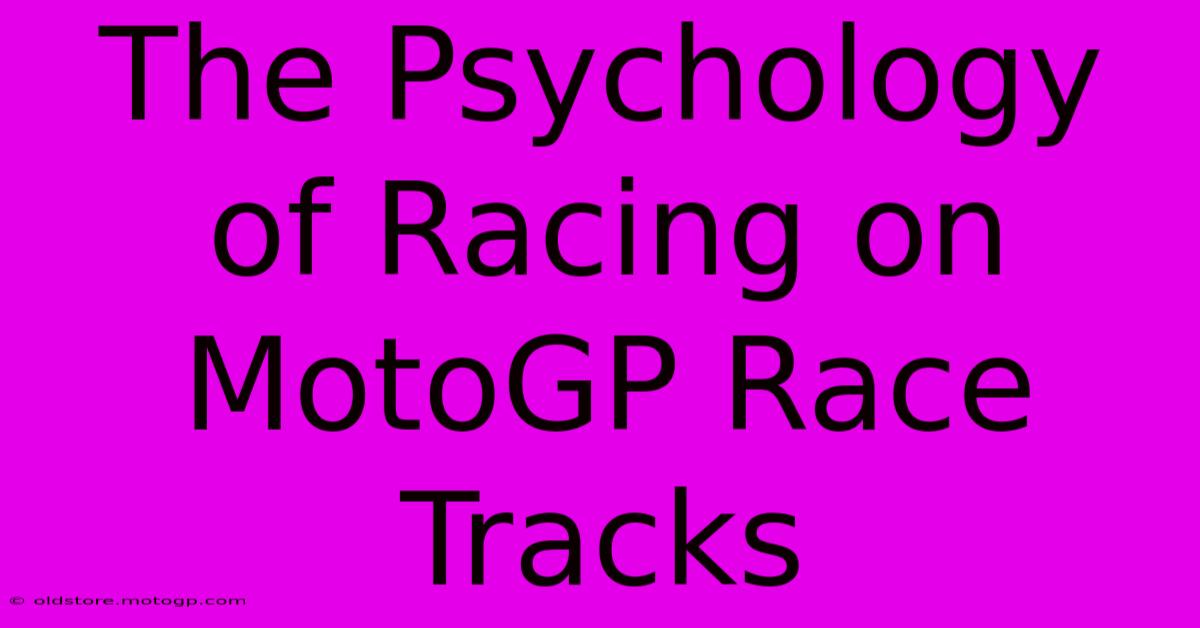The Psychology Of Racing On MotoGP Race Tracks

Table of Contents
The Psychology of Racing on MotoGP Race Tracks
The roar of the crowd, the smell of burning rubber, the sheer speed – MotoGP racing is a spectacle that captivates millions. But beyond the adrenaline-fueled spectacle lies a complex interplay of psychological factors that determine success and failure on the track. Understanding the psychology of MotoGP riders is crucial to appreciating the depth and intensity of this demanding sport.
The Mental Game: More Than Just Skill
While physical prowess and technical expertise are undeniably crucial, MotoGP champions aren't solely defined by their ability to control a 250+ horsepower machine at breakneck speeds. The mental game is just as important, perhaps even more so. The pressure is immense: millions watching, sponsorships on the line, and the constant threat of injury. Riders must possess a unique blend of psychological strengths to thrive in this high-stakes environment.
1. Focus and Concentration:
Maintaining unwavering focus amidst the chaos of a MotoGP race is paramount. Riders must constantly process vast amounts of information – their speed, the position of other riders, track conditions, and the ever-changing racing line – all while executing precise movements at incredible speeds. A lapse in concentration can lead to a catastrophic crash. Training regimes often incorporate mindfulness techniques and mental exercises to hone this crucial skill.
2. Risk Assessment and Decision-Making:
Every overtaking maneuver, every braking point, every corner presents a calculated risk. Top MotoGP riders excel at rapid risk assessment. They constantly evaluate the potential rewards and consequences of each decision, weighing the possibility of gaining a position against the risk of a fall or collision. This requires an exceptional level of composure and the ability to make split-second decisions under pressure.
3. Emotional Regulation:
MotoGP is an emotionally charged environment. Frustration, anger, and disappointment are inevitable. However, the ability to regulate emotions is critical. A rider overcome by anger after a collision might make reckless decisions, jeopardizing their race and even their safety. Top riders develop coping mechanisms to manage these emotions, maintaining a calm and focused demeanor even in the face of adversity.
4. Resilience and Mental Toughness:
MotoGP is a brutal sport, filled with setbacks and disappointments. Falls, mechanical failures, and close calls are common occurrences. Resilience – the ability to bounce back from adversity – is a key determinant of success. Mental toughness, the ability to persevere despite pressure and fatigue, is equally crucial for sustained performance at the highest level.
The Track's Psychological Impact
The track itself plays a significant role in the psychology of racing. Each circuit presents unique challenges: fast corners demanding unwavering confidence, slow, technical sections demanding precision, and long straights testing both nerve and machine. The psychological impact of a specific track can vary greatly from rider to rider, with some feeling more comfortable on certain circuits than others.
The Importance of Preparation and Training
The psychological aspect of MotoGP isn't simply innate; it's actively cultivated through rigorous training. Many riders work with sports psychologists to develop mental strategies for handling pressure, improving focus, and managing emotions. This mental preparation is as critical as the physical training, ensuring riders are optimally equipped to compete at the highest level.
Conclusion: A Winning Combination
Success in MotoGP is a product of a potent combination of physical skill, technical expertise, and unwavering mental fortitude. The psychology of racing plays a pivotal role, impacting every aspect of the sport, from training and preparation to performance on race day. Understanding this crucial element provides a richer appreciation of the incredible feats of these elite athletes.

Thank you for visiting our website wich cover about The Psychology Of Racing On MotoGP Race Tracks. We hope the information provided has been useful to you. Feel free to contact us if you have any questions or need further assistance. See you next time and dont miss to bookmark.
Featured Posts
-
Moto Gp Engines The Driving Force Behind Motorcycle Racings Elite
Feb 21, 2025
-
Get Trackside Ready Cota F1 Apparel And Gear
Feb 21, 2025
-
Yamaha V4 Moto Gp The Sound Of Innovation
Feb 21, 2025
-
The Fastest Airport Transfer In Town F1 Shuttle
Feb 21, 2025
-
Parking Perfection Cota Parking Lot T
Feb 21, 2025
